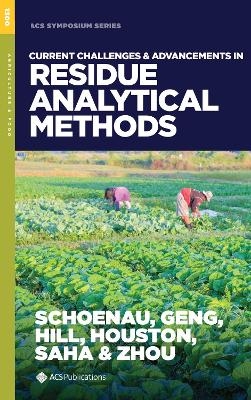
Current Challenges and Advancements in Residue Analytical Methods
Oxford University Press Inc (Verlag)
978-0-8412-3416-1 (ISBN)
- Lieferbar
- Versandkostenfrei
- Auch auf Rechnung
- Artikel merken
As new methods to analyze residues are developed, stakeholders must meet evolving regulatory requirements and scientific challenges. The book discusses advances in method development strategies for new active ingredients and endogenous proteins, while discussing the latest regulatory questions and scientific challenges affecting analytical methods. Those developing new methods for agrochemical companies will find this book useful, as will those broadly working with
regulations. This book is a useful tool for anyone looking to learn more about, or even teach, advanced topics in analytical chemistry.
Elisabeth A. Schoenau lives in Fresno, CA, USA. She studied chemistry at California State University, Fresno, as a Smittcamp Scholar receiving both her B.S. and M.S degrees in chemistry. While at CSUF, she was employed in a variety of chemistry positions ranging from Laboratory Technician and Chemist at local environmental chemistry laboratories, to Forensic Technologist with the Fresno County Sherriff's Department, and Laboratory Technician for the City of Visalia, WWTP. Now she is a Senior Chemist at Golden Pacific Laboratories, a CRO serving the agrochemical industry where her focus is the development, validation, and transfer of small molecule residue analytical methods. Tao Geng is a Protein Chemist and Allergist at Regulatory Science of Monsanto Company. He received his Ph.D. in Food Microbiology from the Food Science Department at Purdue University. His research includes allergenicity assessment of genetically modified crops, and development of antibody-based analytical methods. Ryan Hill lives in Indianapolis, IN, USA. He studied at Indiana University receiving his B.S. in biochemistry with a focus in proteomics in 2009. Following IU, he joined the discovery ADME function of Eli Lilly & Co as bioanalytical chemist with a focus in small molecule analytical method development. He transitioned into Dow AgroSciences regulatory sciences in 2012 with a focus on large and small molecule analytical development, supporting product development through regulatory functions. Now he is a Senior Lead Scientist at Covance Laboratories where his focus is in the scientific oversight of drug development for preclinical and clinical pharmaceutical trials. Norma L. Houston is originally from Warsaw, North Carolina. She has a background in plant biology and received a Bachelor of Science in Biology from North Carolina Agricultural & Technical State University (2001) and Doctor of Philosophy in Functional Genomics with a minor in Plant Biology from North Carolina State University (2007). Her postdoctoral work in plant biochemistry and proteomics was performed at the University of Missouri (2010). Since 2010, she has been a research scientist for DuPont Pioneer Seeds Regulatory Science. Her expertise includes the quantification and characterization of plant proteins using mass spectrometry and other aspects of proteomics. Manasi Saha was born in Calcutta, India. She received her undergraduate degree in Chemistry and M.Sc. degree in synthetic organic chemistry at University of Calcutta, India. After that, she came to United States for further study and received her Ph.D. degree in synthetic organic chemistry at Boston college, Boston. Upon completion of her doctorate, she joined as a post-doc at Northeastern University, Boston, and then continued to work as a Senior Research Fellow. Since 1993, she is working at BASF Crop Protection, RTP, North Carolina, and currently is a Senior Research Associate at BASF. She is engaged in project managements and research and development for crop protection chemicals. Her expertise covers organic synthesis, residue analytical method development for trace analysis as well as the regulatory aspects of agrochemicals. She is actively involved with American Chemical Society and organized number of symposiums for Agro division during past years. Xiao Zhou was born in China in 1985. She studied chemistry at Nankai University, Tianjin, China and obtained her Ph.D. degree in analytical chemistry under the supervision of Prof. Gavin E. Reid at Michigan State University in 2012. In the same year, she joined Dow AgroSciences (currently Corteva Agrisciences, Agriculture Division of DowDuPont) as a scientist. Since then, she has worked extensively on environmental fate, crop and animal metabolism, and analytical method validation studies on a number of molecules as study director and/or subject matter expert for environmental and human safety assessment to support pesticide regulatory registration.
Preface
General Residue Method Considerations
Chapter 1. Elements of Method Design, Elisabeth A. Schoenau
Chapter 2. The Use of Radiolabeled Compounds for Residue Method Development, Phillip Cassidy
Chapter 3. From Regulatory Considerations to Globalization of Residue Analytical Methods, Manasi Saha
Chapter 4. Evaluation of Extraction Efficiency of Residue Analytical Methods, James J. Stry, Xiao Zhou, and Venkat Gaddamidi
Testing of Proteins in Agricultural Biotechnology
Chapter 5. Data Trends in Protein Analysis for Safety Assessments, Rong Wang, Ryan C. Hill, and Norma L. Houston
Chapter 6. Endogenous Allergens from Genetically Modified Soybean: Background, Assessment, and Quantification, Tao Geng, Yongcheng Wang, Lucy Liu, Bin Li, and Ryan C. Hill
Challenging Matrix Types
Chapter 7. Challenging Matrixes: Bee-Related Matrixes: Challenges and Techniques for Residue Analysis, R. Stephen Andrews
Chapter 8. Creation of a High-Throughput Method for the Analysis of Thiamethoxam in Bee Matrixes, Joe Warnick
Chapter 9. A Stepwise Approach to Method Development, Steven C. Moser
Editor's Biographies
Author Index
Subject Index
| Erscheinungsdatum | 02.12.2019 |
|---|---|
| Reihe/Serie | ACS Symposium Series |
| Zusatzinfo | 36 |
| Verlagsort | New York |
| Sprache | englisch |
| Maße | 158 x 236 mm |
| Gewicht | 428 g |
| Themenwelt | Naturwissenschaften ► Chemie ► Analytische Chemie |
| ISBN-10 | 0-8412-3416-7 / 0841234167 |
| ISBN-13 | 978-0-8412-3416-1 / 9780841234161 |
| Zustand | Neuware |
| Haben Sie eine Frage zum Produkt? |
aus dem Bereich


